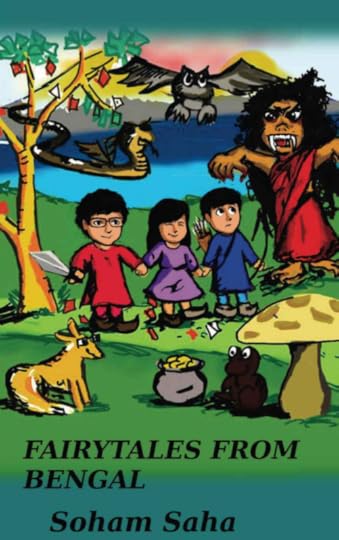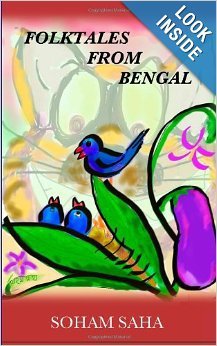Soham Saha's Blog
June 18, 2016
Book Promotion from19 to 26 June
Get ready for a promotional sale of Fairytales from Bengali, going from June 19 to June 26, 2016.
List price: 3.99 USD
Discounted price:
$0.99 from 19 to 22 June.
$1.99 from 23 to 24 June.
$2.99 from 25 to 26 June.
Get yours today.


January 31, 2016
You’d think I’m guilty, but…

Now I don’t know whether what I did classifies as backstabbing or not, so don’t judge me yet. I mean, I do feel guilty now I’ve done it, but now, what’s done is done, right? And the ends justify the means, right? So I got nothing to lose at all. Well I guess it will be easier for you to judge me if I actually told you what had happened. There, why’d I have to say-‘judge me’? Don’t judge me, just listen.
It all started a couple of weeks ago, when I got this notification on our hostel notice board that a fairy-tale writing competition was about to happen. Everyone was supposed to write a short story titled – Redemption. The first prize was a thousand bucks – that’s a month’s rent, even after I’ve paid your tabs. How ‘bout a beer on the house, now? No? Okay.
Anyways, I’ve been writing fiction ever since I was a little boy, see? Don’t be judging me from what you’re hearing now, this is because I’m nervous it’s not all coming out straight. I tore off the notice, not to cut competition, but just to keep myself motivated, seeing it when I wake up and all that.
I remember keeping the piece of paper on my writing desk. And when I woke up, it was gone! Later it turned out that Jack had it. Can you believe it? Jack, just goes off picking up stuff from my table, not bothering to ask. Oh, who’s Jack? He’s my roommate. Me and him had been living on this hostel for about three months now. I brought him here once; he never paid for that beer. He’s a wannabe writer. Writes screenplays, and has got rejection mails littered across half the room. Sure I didn’t get published, but that’s because the publishers don’t really understand my talent. But his stories, well, let me tell you, are pure scanydoodle. Picks up a bit from Hemingway, a bit from Faulkner, and tries to pass them off as his ‘style’.
So anyway, he stole my notice. The notice I had stolen you say, okay fine, have it your way. He steals the ‘stolen’ notice, and makes this preposterous decision, that he will enter the contest, too. And he said we could review each other’s work. I agreed of course, just to be polite.
The next day, we were brainstorming plots. We split the elements, so he ended up having Dragons, Elves and Trolls, while I had Dwarves, Humans, and Orcs. We didn’t want to use the same creatures, you see, because thought we’d have the same theme then. So anyways, I started off with the epic fight between Humans and Orcs the first day. At night, we swapped our copies, and peer-reviewed. It turned out that he had also started off with a battle, between Elves and Dragons. So I thought, since both of us are having the same approach, may be a lot more of other writers would write ‘bout the same stuff. So I started all over again in day two. I took the Orcs’ point of view – no one sympathizes with Orcs, and that’s plain sad. I mean, they might get hungry for Human meat, right? You know, like humans need to eat meat for vitamin B-12, and so on. So Orcs might have a similar problem. Jack seemed to like by idea, but he stuck to his theme, same good Elf versus bad Dragon. I thought we’d hold off peer review till the stories are done.
Then came the day of submission. Jack had to go home for his sister’s wedding, and I had to mail both of the stories. But before posting, I fell into the dilemma. What if his story was better? I read it, and re-read it, and you know, the story kept feeling better than mine. Well I was actually trying to imagine myself as a critique reading the story. So his idea seemed more mainstream, and more coherent. You know, elves fighting with dragons does have a familiar tinge to it, right? And who’d heard of good Orcs, I mean, my Orcs weren’t even good. Some of them were cannibals, and when will humanity accept cannibalism? Don’t give me that look, it’s just the story I’m talking about. I’m not crazy. And give me a shot of tequila.
So at the last moment, I feel really guilty admitting this, but I have to, you know, I swapped the stories. In my defense, I think I would’ve written a mainstream story as well, if he hadn’t. And firstly, he wasn’t even supposed to know about the contest. He stole the notification from me, right? Had I written the Elf story, mine would’ve been the same thing – same twists, same theme, same creatures. And mine would even have been even better.
So anyways, here’s the outcome. The result came yesterday by mail. Dear contestant, we are happy to inform you that you are our winner –and that shit. But here’s the dilemma, see, I won! So what’s the catch? Nothing, except that it was my story that won – the Orc and Human one. Turns out that the judge had an open mind, after all. After Jack showed me the letter, I was astonished to say the least, and I didn’t know whether I’d laugh or cry. So I did the bold thing now. I told him what I did. I told him I did it by mistake, of course, and by God, it’s the worst mistake of my life, I admit it. But you know what he did? He packed up and left. He won’t even listen to me now, because he knows, deep down, that I’m right.
Just today, I learnt that he is getting an offer from Bloomsbury, for a novel. They really bought into that orc idea. So who do you think is the betrayer here: me, him, or just my luck?
Image: http://learningtolivelikewaterblog.co...


January 30, 2016
Free book promotion on Kindle
My book, “Folktales from Bengal”, will be free for download in the kindle store tomorrow.
Please read it and leave a review on Amazon or Goodreads.
Thanks!
Link: http://www.amazon.com/gp/product/B00I...


January 5, 2016
Odd tidings – I sold a story to Every Writer Resource, and I didn’t know it!
There I was, checking the SEO status of my book, Fantastic Folktales from Bengal, when I stumbled upon this.
I googled myself, expecting to find my website or my book, but came across a story of mine that had been published in Every Writer Resource, a website that has – well, you probably guessed it – resources for writers, especially self published and small press. I had sent them my horror piece “Under my skin“, in response to their call for Halloween submissions. The reply kind of felt ambiguous, and I didn’t get whether they were accepting my story for consideration, or for publication. Obviously, it’s the latter. But it would have been nice if they had sent me an email when it actually got published.
I am having mixed feelings about this, really.
You can read the story here.
If you want a copy of my book, you can get it here and here.
Use the code 6JAM56AC if you are buying it from the Createspace store for a $5.00 dollar discount.


December 3, 2015
Science fiction story: Where my children grow (Part 5 (END))

In the gathering that followed, he looked around for George, but could not find him anywhere. May, the woman he had seen George talk with, approached him instead. They talked for about half an hour. It turned out that she had an ancestry of farmers. Claud thought it safe to tell her about the flower that stared at him.
“First time with sunflowers, eh?” she asked him, smiling.
He nodded.
“Don’t worry, what you’re working with is what they call a Watcher. It’s locking onto your infra-red radiation, some distinct frequency you emit. Nothing to worry about.” she waived it off.
Claud could not express the enormous sense of relief that he felt. He laughed at himself for worrying. Even if the flower was an anomaly, what harm could it possibly do?
Right before entering his dome, the guard told him that George was diagnosed with the cabin fever and was sent on leave. But he had passed him his eBook reader.
#
A wave of emotions hit him as he returned to his duties. George being sent off so close to retirement was more unnerving than the fear of cabin fever itself. He erased all his logs from the digipad, as if they would somehow incriminate him with something that would get him fired. He did not dare open the reader, as looking at it drew up a sense of guilt in him that he could not while away. For some time, he considered if he should quit while he was still young.
But then he looked at the field of young sunflowers. He could not leave them. After spending so much time with them, the sunflowers were a part of him now, and he could not part from them until they were grown. It was something beyond the contract he had signed with the company. It was something the company would never understand.
He tried to divert his angst by working extra hard. A cloudy weather outside gave him the opportunity, and he spent the next few weeks adjusting and optimizing the lighting system.
He paid more attention to the watcher now. To his dismay, he found that the plant was noticeably thinner than the others.
One bad plant in an entire batch was not an issue of concern, but he could not shrug it off. He recalled his lessons from his training year, and tried different fertilizers, pesticides, clipping dead parts, but the plant did not change. The shoot bent, and the leaves sagged. But still, it continued its daily routine of staring at him. The petals were adopting a greenish hue, and the leave turned black slowly.
He had a couple of weeks left in his shift, but he was a man possessed. He knew that George was an avid reader and a keen farmer. So he went through his reader. It had a book on plant development, and he went through all the details he thought relevant.
Sunflowers need a lot of water. Apart from the sprinklers working thrice a day, he watered the plant himself.
Rots. They can spread from leaf to leaf. He clipped off leaves that showed the smallest sighs of rotting.
But the plant was dying. Leaves were falling every day.
Magnesium. A lack of it would cause yellowing of leaves. But they seemed to be turning black, and continued to fall. Nevertheless, he applied a magnesium reach mix into the soil.
He wished he had more time.
#
The last day of work arrived much sooner than he had expected, and before he knew it, he was tidying up his cubicle and packing his backpack. He made sure all his logs were deleted from the digipad, hoping no one had read them in the meantime. He had no intention of giving the authority a reason to fire him.
He put his sunglasses on and climbed out of his cubicle. The sunflower plants were in full bloom, but he had eyes for only one. The plant was standing a little taller, and a couple of green leaves were beginning to form among the remains of the wilted, blackened shoot. In his last few minutes, he sucked up the extra water from the soil around it, and put in a support rod to straighten it. But it was all he could do.
He went up slowly to the station. The train was already there. Martha was standing inside the compartment, smiling. She had gained a few pounds in the last months and did not look stressed, which meant the baby was healthy. Bob, who was wearing a pair of sunglasses too big for his eyes, ran up to him and wrapped his arms around him in a strong hug. There was no sign of any illness. Claud patted him on the back and tussled his hair. They sat on the same bench, his arm wrapped around Martha, and Bob on his lap. He looked outside, and just as the train turned and the domes were out of sight, the image of a small plant with two tiny leaves upon a black shoot flashed in his memory. A sigh escaped him, and he hugged Bob tighter.
END
Image: http://www.dreamstime.com


December 2, 2015
Science fiction story: Where my children grow (Part 4)

The first week passed like a breeze. A water pipe had broken, and he had to spend a better part of the week trying to fix it. He had to redirect water from other sources to water that section of saplings He had checked their colour and texture against a chart given in his pad, and they seemed to be perfect so far. But there was a long way to go. The plants had been growing rapidly, developing large, rough petals that were grainy to the fingers. They somehow had the same texture as the bottom of Bob’s feet when he was a toddler. He loved it when he tickled them.
There was nothing special to mark the weekends except for the arrival of mail. The pads had to be connected to a network modem, and emails and other necessary documents were downloaded into them. One of the emails had a picture of Bob waving at the camera, with a mango in his hand. He did not look sick, but seemed to have grown thinner. He wondered if the doctors had diagnosed him well. He tried to remember how often Bob was ill in the four months he was home. A couple of times he had the flu, but that was it. Maybe he had nothing to worry.
The picture of Bob smiling took him back years ago, to his school days. He remembered the ghetto he had grown in – the broken roads that got patched up with mud during the rainy season, seasonal outbreaks of diarrhoea, the leaking roof of the house, his parents arguing.
He had been a good student, and wanted to be a doctor. But even with a scholarship, the fee at the medical school was too high for his father to pay. He could have been a contractor, but decided that farming had better benefits. The pay package was good enough for his family to rent a small flat and send Bob to a good school. With the savings, and the provident fund, he supposed he could send Bob off to medical school. If he managed to complete his twenty years of service, he would get a small house at the city border, away from the pollution and hustle of the crowds. His children would grow up in a better place than he did, and have a much brighter future. It was not a bad choice, even though it meant he had to spend half the year away from his family.
#
In the second week in, he began to get bored. The job was routine, with all of the equipment working properly. There was a standard issue deck of cards in his room, and he tried to play solitaire. He thought about George’s suggestion and started writing his first journal entry.
He thought he would write about the sunflowers and his day to day activities, but he realized that he was writing about his life – his first love, his unfulfilled dreams, and his hopes. He had started writing at ten o clock at night, but when he stopped, it was past twelve. He went through the notes, and realized that he must have had written twelve pages.
#
The first signs of cabin fever began to show themselves near the end of the third week. He was watering the plants in one of the sections manually. He was thinking about what he would eat in the next gathering, when he realized that he was talking to himself aloud. He stopped immediately and looked around. If the company decided he was unfit for work, it would be the end of his health insurance, school for Bob, and the small house at the edge of the city.
One of the plants in the section had started to grow a premature bud. He wondered if regular sunflowers could grow this fast. He checked his pad for the details, but found nothing that suggested they were genetically altered. The company and its secrets, he thought.
The next gathering was uneventful. He thanked George for sending his family the fruits. But he kept his conversations short, partly because he was too embarrassed for asking for his reader, and partly because he had not forgiven him for not giving it to him. George did not seem to notice; he was too occupied with chatting with his mates, and laughing, perhaps a little too often, and a little too loudly.
#
It was another three weeks before he noticed the oddity. The flowers had started to bloom – large, yellow ray florets surrounding black, tiny, circular ones. The flowers kept facing the light tube at the centre of the room during daytime, and at night, they faced the floor. With the floor, the wall and part of the ceiling carpeted with the black yellow flowers, it was quite a lovely sight.
He had been spending the weeks immersing himself with his work, obsessing with the tiniest details of the plants: a slight change in the texture, a slight wilt, a spot on the leaves. He did not want to let any hint of abnormality escape him. So when he found a little yellow flower staring at him instead of the centre of the room, he was startled indeed.
At first, he thought the flower was facing a random spot in the room instead of the light source. But soon, he realized that if he stayed at any particular point in the room for long, the flower turned to face him. Upon close inspection, it seemed no different from the others, except for the orientation of the flower. He recalled it being the same flower that had formed buds before all the rest. He spent an uneasy night that day, with nightmares where he was getting strangled by vines.
The days that followed were the longest he had spent. He thought of cutting the flower off. But it was illegal to snip off flowers unless they were infected. He thought of twisting the flower off to another direction, but chances were that it would break again. He thought of sending a message to his supervisors, but somehow, did not think that being afraid of a flower would be good for his career.
So he waited. The plant seemed to be ordinary in every other aspect, perhaps a bit frailer than the others, if he looked closely. No. He would wait. He did not even include it in his journal, no telling if the company was keeping an eye on it. No. He just had to wait.
(To be continued)
Image: http://www.dreamstime.com/royalty-fre...


November 30, 2015
Science fiction story: Where my children grow (Part 3)

When he woke up, the clock said it was 2 am. He was perhaps more tired than he had realized. He decided he would take the soil samples on the next day. He climbed out of his room, and put on his mask. As there was no photosynthesis going on during the night, the oxygen levels inside the dome dropped.
Without the sunlight passing through the light catcher, the Dome felt eerily dark. Bluish specks of light scattered throughout the wall – distorted images of stars focused by the light catcher. He took a closer look at the saplings. Two large cotyledons had sprouted from each, and the plants bent down slightly in the absence of sun. After a brief walk through the greenhouse, he went back to his room and fell asleep.
His digipad said that there would be a ‘gathering’ the next day. That was something to look forward to.
#
The gathering took place once a month. It was an act of socialization for the farmers, and did them well after months of isolation. He woke up early the next day, prepared himself, and waited patiently by the entrance. The door opened, and a guard took him to the dining room. Although the farmers were given a modest ration every day, food during the gathering was looked forward to. Tables of buffets were lined up in the middle of the room. There was a small kitchenette for those who liked to cook. People were already helping themselves. He spotted George sitting among a bunch of unfamiliar faces. There was a woman talking to him.
He picked up some sausages and egg, a glass of orange juice, and took a seat at their table.
“Claud,” George said with a smile. “Long time. How’s the Missus?”
“Martha’s fine.” Claud said, nodding curtly to the others. The woman left the table to get more food.
“Where did they hook you up to, this time?” George asked.
“Sunflowers.”
“Lucky bastard. Four months to freedom. You know how long I’ve been stuck? Five months, with six more to go,” George huffed.
“They are paying you thrice as much.” A man from across the table said.
“They are trying to break me. That’s what they are trying to do,” George said. ”One bout of cabin fever, and I’m through. But they won’t get me, though. I’ve got just a year left.”
There was a murmur of agreement. They discussed about how many of the farmers could actually get to the retirement age. It turned out to be a handful of lucky ones. An open secret in the company was that more got fired than retired. But the benefit package was worth the fight.
The conversation shifted to the living conditions of most of the farmers. The city was getting more crowded every year, with no sign of population control. Most of them lived in shared flats. Less people, less consumers, less profit, someone commented. Everyone seemed to agree that large corporations were behind everything that was wrong in the world. Claud did not voice his opinion. Who knew when they were being listened to?
In the midst of the conversation, he told George about Bob’s illness, and if he could manage some tropical fruits, and George assured him that he would send some over.
They spent the rest of the afternoon playing billiards. When it was time to return, Claud remembered about the eBook reader. He was hesitant to ask, with George already helping him with the fruits. But when they were shaking before parting their ways, he blurted out,
“I need your eBook reader.”
George gave a visible shudder.
“What am I supposed to do, then?”
“I really need it, George. I forgot mine.”
“No doubt about that. But I can’t part with mine. I’ll be crazy by the end of the week,” George said. “Relax. It’s your first month. Put in a request for a reader. They’d clear it soon. The first month’s the easiest. You’ll get something by then. Play solitaire, write a journal.”
He left before Claud could say anything more.
Claud could not blame him. He had already been here for five months. The monotony would get to him faster than it would anyone else. In fact, he felt ashamed that he had asked for it in the first place.
In his last hour in the dining hall, he checked his emails. Bob’s fever was gone, which was a thing of relief. He arranged with the pharmacy to ship off some medicine to his family.
There was some more routine detox session before he could enter his dome again. He spent the remainder of his day collecting soil samples and testing their mineral content.
(To be continued)
Image: http://www.dreamstime.com/royalty-fre...


November 29, 2015
Science fiction story: Where my children grow (Part 2)

Sunflowers –the pad said. Required for the production of oil for shipment to northern districts. Time of growth – 4 months. Crops should be prepared for harvest at the end of shift.
Claud inspected the Dome he just walked into. From inside, the room looked like a hollow tower. The ceiling was ovoid in shape, with a tubular structure protruding from the middle. To someone who saw it for the first time, it would look like someone had sawed off a circular area in the ceiling, and inserted a giant plastic bottle through it, bottom first. This tube, commonly known as the light-trap.
The walls of the room comprised a crisscross array of shelves, which came out of the walls sloped at an angle to the floor. They held the plants in an orientation where the leaves would get maximum exposure to the sunlight from the light trap.
The purpose of this complicated design was very simple: minimum area, maximum yield.
The solution started as a high school project that aimed to provide densely packed slums a way of lighting up their rooms. A small hole was cut into the roof, and a water bottle was entered in the hole, half of it sticking out of the hole, facing the sun. The outer portion of the bottle was wrapped with aluminium foil. The shiny metal would reflect light into the water in the bottle, and the light would be refracted and reflected by the water downwards into the room. Because of the refracting property of the water, a small hole in the roof could squeeze in a surprisingly large amount of light.
The method had its drawbacks, of course. The light could be caught only during the day. The roof tended to leak once the sealing around the bottle hardened and began to chip off. As a lighting system for slums, windows worked better. But someone decided to put the idea into farming instead.
The first Agro-dome was about fifty square meters in area, and five stories high. The top was a water reservoir cum light trap, made of toughened fiberglass, and supported by aluminium, which also reflected the light in. Inside the structure, a honeycomb structure of wooden walls containing fertilized soil provided the seeding area. A variety of crops was tried, and gave record yields of grain per area of land used.
The building in which Claud worked was a modern version of the Dome. The current one contained just sunflowers, but advanced structures could grow up to five varieties of plants. Most of the buildings were computer controlled, but each required someone to keep an eye on the plants. It was found out that a human was more likely to spot an anomaly in the crop than a computer, at least for now.
#
Claud could not complain about the workload, but had to admit that it was monotonous. But he was a natural gardener, and enjoyed working with plants. He started his day by taking a walk through the garden. He checked the plants for signs of drying up, fungi. He climbed up the ladder to different corners with a light meter and checked if some plants were getting less light than others. More light could cause the plants to wilt, and less light would result in slower growth.
This Dome was about an acre in area, and could produce the sunflower seeds equivalent to ten times the amount a normal farm of the same area could produce per year, thanks to the clever structural engineering, and the miracles of genetic engineering.
He checked his pad and ticked off light inspection. He glanced around to see if there was some anomaly in the orientation of the growth panels. They seemed all right. He decided that he would take a nap in his cabin before testing out soil samples.
The cabin was accessible by a circular hole on the floor at the center of the greenhouse. It had a small bed, a study table, a table fan on the table, and a small electric light. The moment he rested his head on his pillow, he realized that he had forgotten to bring a vital thing to work – his ebook reader.
#
Four months in near isolation, without a single thing to keep him occupied. The worry began to manifest itself. Cabin fever wasn’t uncommon for the Dome-farmers. The monotonous work for extended periods of time could give rise to an extreme case of irritability and restlessness. One way to prevent it was to keep yourself distracted, and Claud’s distraction was books.
Besides plant-wide outbreaks of chickenpox or viral fevers, cabin fever was the number one health hazard of working in the dome. Chicken pox would get you medical leave. But once you got hit by cabin fever, you had to retire. And early retirement without the retirement package meant all the years of hard work and time invested in the career gone, just like that.
“I’ll borrow one from someone tomorrow,” he thought, but he wasn’t hopeful. It was highly unlikely that someone would have a spare reader, and even more unlikely that they would share the one they had.
It was not a good idea to let stress build up. He tried to think of something else. He wondered if Bob still had the fever, but had no way of knowing. Telephones were not one of the facilities the cubicles had. There was an intercom, but that was for emergency use only. The digipad had no internet connection either. Research had found that the presence of networks in the dome had a negative correlation with crop growth. Claud did not buy this explanation, though. A more plausible explanation to him was that workers would get addicted to Farm-villa and spend less time tending the plants. But they were wrong. Books could be more addictive.
(To be continued)
Image: http://www.dreamstime.com/royalty-fre...


November 28, 2015
Science fiction story: Where my children grow (Part 1)

Claud looked out the window at the densely packed array of buildings that wheezed by as the train moved forward. The city: an overly dense, gloomy, dingy assortment of apartments that he called home. The scenery was going to change after the next stop. The agricultural district was almost here. He sighed.
Martha gave his hand a slight squeeze. “Don’t worry. It’ll be over in no time.”
He raised his eyebrows, still looking outside. The train turned, buildings gave way to a blue patch of sky. It was clear without a hint of cloud.
“It’s not me I am worried about.” He said.
He thought about Bob – how his hands clutched the teddy bear as he slept. He had insisted that he was woken up when Claud left. Claud wanted to say goodbye too, but had thought against it. There was no need to put the boy through any stress in his condition.
“Bobby’s going to be better in no time. The doctors think it’s just a fever,” Martha said, sensing his worry.
“Yeah, that’s what they said about old man Bill. I don’t trust these community doctors. Take him to a private clinic, okay? They pay more attention.”
“Bill was sixty five,” Martha said, her voice firm, “And Bob’s going to be fine.”
“Don’t get the antibiotics from Ronny’s. I’ll get them from our company pharmacy. I can use my insurance, and the batch will be fresh. Ronny sells expired stuff. We won’t get that nonsense in the company store.”
Martha nodded and passed him the prescription.
“We still owe Matt fifty bucks.”
Martha was smiling now. “Don’t worry. I’ll take care of everything. You just focus on what you have to do the next few months.”
“The next four months.” Claud’s expression darkened. Four wasn’t few. Not where he was going. He thought of his little flat. The small bedroom. The dining table with the plastic fruit bowl they had brought the previous year. Bob’s little room with his heap of toys and his desktop. Bob sleeping with one of his legs hanging out from the bed. Martha knitting a sweater by the heater. It would be six months before he saw all that again. Actually, he would never see any of it again. The fruit bowl would probably disappear. Bob would be at least an inch taller. The toys would disappear. Heck, Old man Bill had died when he was away. Why did he choose this life again?
“Try to send some tropical fruits if you can manage it. Bob likes them,” said Martha.
That was why. The promise of a better life. At least, bits and pieces of one.
“The orchards are ready for harvest. I’ll send over some lychees.”
“Bob likes mangoes.”
“You know how mangoes go by in the market? But I might get George to get me a couple. He owes me a favour.”
The train was beginning to slow down. Claud put on his sunglasses, and handed a pair to Martha. And not a second sooner, because a series of bright specks began to appear in the horizon as soon as they put them on. They increased in number as the train drew nearer, and soon, the train was passing through a line of tall, transparent towers, each gleaming in the sunlight. The temperature inside the train increased in the heat reflected from the towers – the Agro-domes. Beads of sweat appeared on Martha’s forehead.
“Is it this hot inside the domes?” She asked.
“Depends on what you are growing.” Claud said. Sometimes it was even hotter, if you were growing a tropical fruit.
There were few passengers left in the train now – all workers in the agricultural district. Claud began to see some familiar faces, but did not greet them. Most of them were busy saying goodbye to their families.
The train screeched to a stop.
Claud gave his wife a cursory hug before he got down. Only workers were authorized to alight at the stop.
“I should have said goodbye to Bob,” he said.
“No worries. Just come back safe and sound, okay?” Martha held a handkerchief to her face now. If it had not been for the sunglasses, he could probably see tears in her eyes.
It’s the hormones, he thought. Then he remembered.
“You take care of yourself, too. Don’t stress yourself too much,” he said. “With the baby on the way, you know.” He was not much of a talker. It was these emotional things that usually died before they got out of his mouth.
The door closed, and the train was going back the way it came. Claud looked at the shrivelling figure of his wife, and waved. Then he picked up his backpack and joined the crowd at the entry gate. He scanned his ID card in and entered the detox room.
The ‘shift’ was about to begin.
#
Detoxification was a long process. The workers had to enter a large bathing room at first, where they had to strip down and shower for an hour, with a company provided disinfectant soap. Then they dried off using a towel, and spent another hour at the desiccation room. Next, each worker was assigned a separate room for another level of washing, this time with chemicals depending on the crop they were going to tend. Different plants had different kind of pests – bacteria, viruses, and fungi that could affect them, and in the confined environment, even a single fungal spore could cause a catastrophe.
Finally, they were assigned their clean-suits, and given a digital pad with instructions on their duties. They were lead to the domes, where they had to spend the duration of their ‘shifts’, which could range from two to ten months, depending on the harvest.
When the door to the Dome opened, a gust of warm air flew in. Claud assumed it would be a tropical fruit orchard, from the temperature. He looked at his pad. He was wrong.
(To be continued)


November 20, 2015
Science fiction short story: Waiting for rain (Part 3/3)

The back of my neck heated up from the radiation from the chip. Suddenly, there was a faint “pop” of a fuse, and the images flooded into my head in a flash – my mother pouring hot sauce in my mouth, my mother making me kneel down facing the sun- only this time, I could see the woman’s face. It was not her. It was a different woman every time. And in a flash, the memories were gone, leaving a bitter taste in their wake.
My hand started to shiver from fatigue as I contacted my supervisor.
“Feeling better?” He asked.
“You are feeding me with false memories.” I wanted to sound angry, but my voice was that of despair.
He looked surprised for a second. But it was just for a second.
“It was only to help you,” he said, as a matter of factly.”It usually works. I guess it’s time we hire a new technician.”
I drew a deep breath to calm myself.
“I want to attend the funeral.”
“Do you see the weather outside? I am sorry. We can’t afford to lose anyone from the station now. We will arrange for a broadcast now in your screen.”
His image disappeared, and was replaced by a hologram of my mother in the cemetery. She was dressed in white. Her head looked strange without her hair. Her eyes were closed, and her face had a bluish tinge to it. I saw the laser being positioned over her. Someone was reading prayers aloud. A cold air rushed in through the open window, and I felt the surge of nostalgia hit me again. There was a beep and a flash. And the next instant, she was gone, blown away by the wind. My hands began to shiver again.
Suddenly, I knew what to do.
I entered the security code to lock my door; then I stuck my chair against the lock. I took a set of pliers, and wrenched open the chip from the back of my neck. A siren sounded somewhere. It was as if a curtain had been lifted from my eyes.
I opened all the windows, and let the stormy winds soak me. And then I saw it.
I was lying on the bed, my head on mother’s lap. It was raining heavily outside. There was a clap of thunder, and I shivered. Mother caressed my hair, and said, “It’s okay. It’s okay.” Then she began to sing, the howling winds providing a backdrop for her voice. I hugged her, curling myself up in her warmth, feeling safer than I ever felt before.
The rain started. Cold water ran down my cheeks, mingled with the warmth of my tears. The overflow meter blinked again and again. Someone was trying to break the door. I just looked at the distant clouds, trying to see her face.
The End
Image: http://img.eltipografo.cl/media/2014/...







